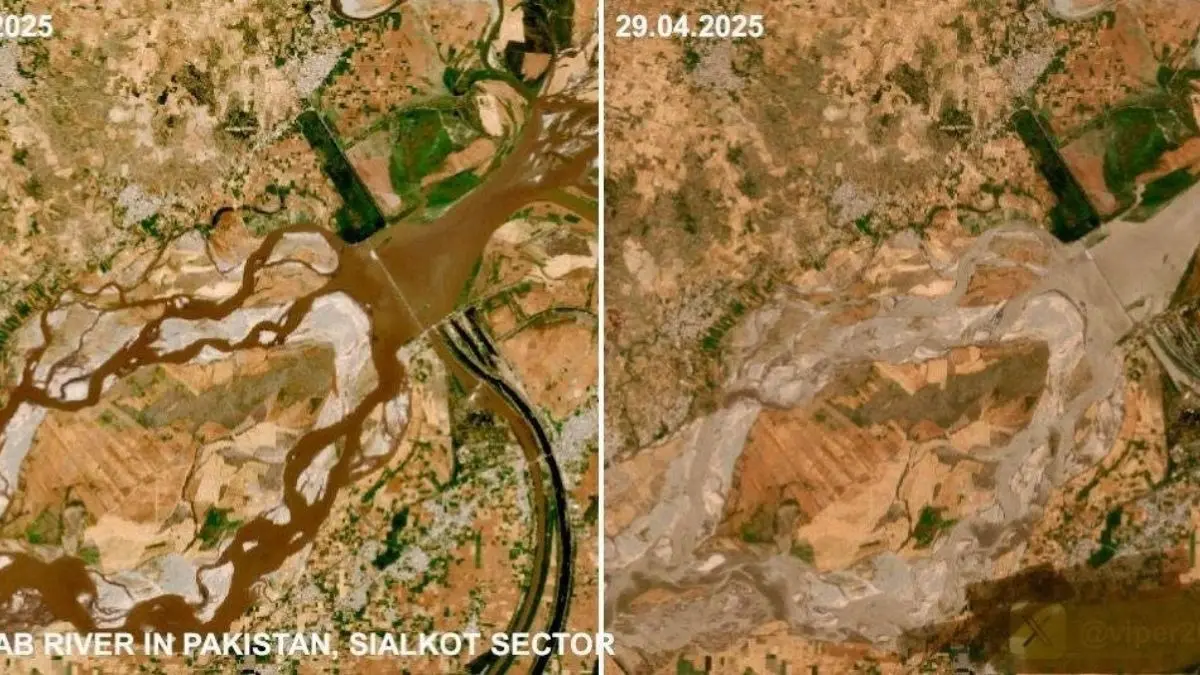Updated 30 April 2025 at 14:05 IST
Before After Images Show Dry Riverbed of Chenab as India Turns Off the Tap for Pakistan in Response to Pahalgam
The Indus Water Treaty (IWT), signed on September 19, 1960, was brokered by the World Bank after nine years of negotiations.
- India News
- 2 min read

New Delhi: After India suspended the decades-old Indus Water Treaty with Pakistan following the Pahalgam terror attack, fresh satellite images reveal the Chenab River running nearly dry near Pakistan's Sialkot. Once a flowing river vital to Pakistan’s water supply, the images now show a lifeless waterbody with little to no flow, signaling a major shift in regional water dynamics.
India Halts Treaty After Pahalgam Attack
India suspended the Indus Water Treaty—a long-standing peace agreement signed in 1960 for sharing river waters between the two neighbours—in response to the deadly terror attack in Pahalgam, Jammu and Kashmir.
The treaty, which had survived wars and political tensions, allowed both countries to share the waters of seven rivers originating in India and flowing into Pakistan.
Advertisement
What is the Indus Water Treaty?
The Indus Water Treaty (IWT), signed on September 19, 1960, was brokered by the World Bank after nine years of negotiations. It provided a framework for the sharing of cross-border rivers, with India receiving control of 30% of the water, and Pakistan the remaining 70%.
Under the agreement, India gained exclusive rights over the Beas, Ravi, and Sutlej rivers, while Pakistan received the Indus, Chenab, and Jhelum rivers—even though all of them originate in India.
Advertisement
India Invokes Treaty Clause for Review
India’s notice to Pakistan states that “fundamental changes in circumstances” now call for a fresh government-to-government negotiation, as per Article XII(3) of the treaty. Indian sources said the reassessment is necessary due to changing geopolitical conditions and security threats.
Why it Matters for Pakistan
Pakistan heavily depends on the Indus, Chenab, and Jhelum rivers for its water supply. These rivers enter Pakistan through India, and under the original terms, India could use only 20% of their waters, while 80% flowed freely into Pakistan.
The unrestricted flow was based on trust and a desire to avoid humanitarian crises in times of conflict. However, the suspension of the treaty could now disrupt Pakistan’s irrigation and water supply systems, especially in Punjab and Sindh provinces.
Get Current Updates on India News, Entertainment News, Cricket News along with Latest News and Web Stories from India and around the world.
Published By : Aditi Pandey
Published On: 30 April 2025 at 14:05 IST
